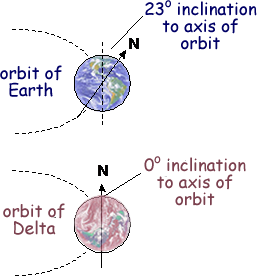Questions on the Earth in Space
Q17.
A writer of science fiction likes to make her stories as realistic as possible. In her latest book there is a group of space travellers who discover a star in a distant part of the galaxy. The travellers are excited to find a planet very similar to Earth orbiting this star. They call the planet Delta. The table compares data about Delta and the Earth. Most of the figures are relative.
| |
Delta |
Earth |
The planet's distance from the star it orbits.
|
1.5 |
1 |
Mass of the planet
|
1.5 |
1 |
Average density of the planet
|
1 |
1 |
Time for the planet to rotate once on its own axis
|
0.85 |
1 |
Speed of the planet in its orbit
|
0.82 |
1 |
Angle of tilt of the planet's axis
|
23o |
0o |
Acceleration of an object freely falling near to the planet's surface
|
11 m/s2 |
10 m/s2 |
(a) In her story, how should the writer compare conditions on Delta with those on Earth? Tick the correct box in each case.
|
greater |
less |
same |
length of year |
 |
|
|
length of day |
|
 |
|
radius of the planet |
 |
|
|
3 marks
(b) One of the space travellers lands on planet Delta. With her space suit, she has a mass of 100 kg. What is her weight on planet Delta? Don't forget to give the unit.
weight = mg = 100 x 11 = 1100  N
N 
2 marks
(c) The inclination of the axis of rotation to the axis of orbit (the 'tilt' of the planet) is different for Delta and Earth.

In the story, the travellers spend a year on Delta. Describe two differences between Delta and Earth that the travellers would find, apart from their weight.
any two from: 

- There would be no seasonal variation on Delta like we have on Earth.
- Temperature in a region of Delta would be roughly the same all year, whereas on Earth it is colder in winter.
- There would be no hibernation or migration of animals on the planet Delta as their habitat would have constant conditions.
- Days and nights on Delta would always the same length - half of the time it takes to rotate on its axis. On Earth the day length increases from mid-winter to mid-summer
- The Sun would always be directly above equator on Delta - accept 'Sun always follows the same path across the sky'
2 marks
Maximum 7 marks







